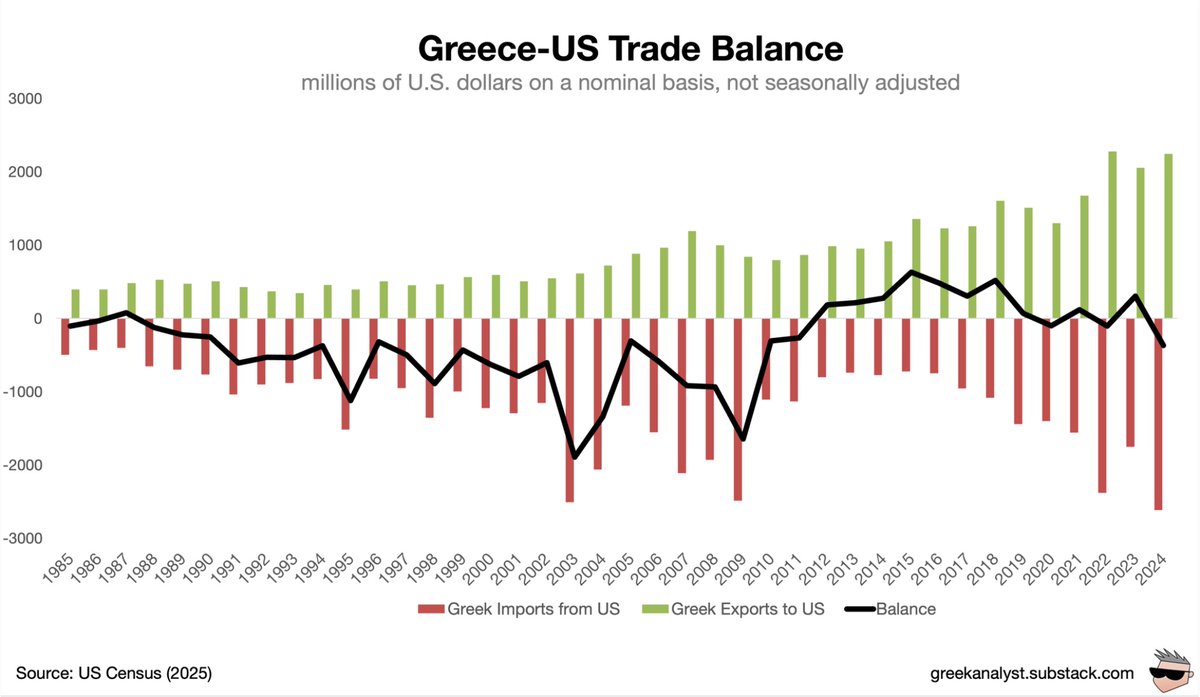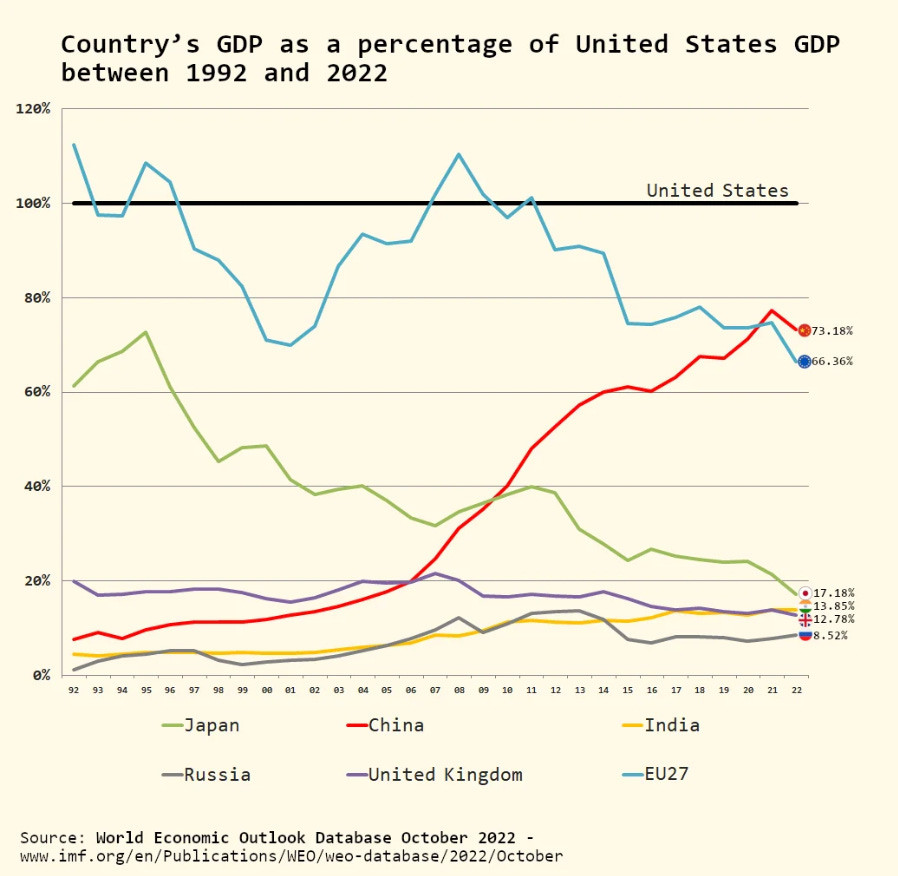Balance of salaried employment 🇬🇷
2024 ended with +70k net new salaried jobs being created in Greece.
This is the lowest positive difference since 2012, mostly due to an increasing tightness in labour market conditions.
2024 ended with +70k net new salaried jobs being created in Greece.
This is the lowest positive difference since 2012, mostly due to an increasing tightness in labour market conditions.

Minimum Wage 🇬🇷
Greece’s minimum wage has increased considerably during the last decade.
From €586 in 2018 the minimum wage in Greece (on a 14-month basis) will now be €880 starting on April 1st 2025. That is quite a spectacular jump.
Greece’s minimum wage has increased considerably during the last decade.
From €586 in 2018 the minimum wage in Greece (on a 14-month basis) will now be €880 starting on April 1st 2025. That is quite a spectacular jump.

The minimum wage in Greece has increased considerably since 2020, over and above the cumulative effects of inflation. 

According Eurostat, the Greek minimum wage has increased 42% between 2015 to 2025 (even without factoring the latest increase on April 1st).
This places Greece 12th out of 22 EU countries with a national minimum wage.
This places Greece 12th out of 22 EU countries with a national minimum wage.

According to the latest available data from the OECD, the real minimum wage in Greece in 2023 was the highest since 2011 — that’s a 13-year record.
Still below the pre-crisis peak, but consistently moving up.
Still below the pre-crisis peak, but consistently moving up.

Average full time salary per employee 🇬🇷
The average full time adjusted salary per employee in Greece reached its highest level in 2023 since 2015 at €17k.
Sadly, it still remains significantly below EU average at €38k, a divergence growing since the crisis started in 2009.
The average full time adjusted salary per employee in Greece reached its highest level in 2023 since 2015 at €17k.
Sadly, it still remains significantly below EU average at €38k, a divergence growing since the crisis started in 2009.

Greece ranks 3rd from last across the EU in terms of its average annual full time adjusted salary per employee. 

Average monthly salary (private sector) 🇬🇷
In 2024, the average gross monthly salary in the private sector hit €1,342 per month.
That’s a new record and marks a +32% increase since the 2015 lows.
In 2024, the average gross monthly salary in the private sector hit €1,342 per month.
That’s a new record and marks a +32% increase since the 2015 lows.

In 2019, more Greeks were earning below €1,000 in the private sector than above €1,000.
In 2024, the situation has completely flipped.
Greeks are increasingly earning higher salaries in the private sector, with the largest category now making between €1,000-1,500 per month.
In 2024, the situation has completely flipped.
Greeks are increasingly earning higher salaries in the private sector, with the largest category now making between €1,000-1,500 per month.

Average monthly salary (public sector) 🇬🇷
Following the increase of the minimum wage in April 1st 2025, salaries also increased across all salary levels and years of experience in the public sector.
Following the increase of the minimum wage in April 1st 2025, salaries also increased across all salary levels and years of experience in the public sector.

Difference in private and public sector salaries 🇬🇷
Historically, there has been a large wage gap in favor of the public sector in Greece (even +20-25%).
Since about 2015, this has flipped in favor of the private sector, with average monthly wage in 2023 reaching +18.6% higher.
Historically, there has been a large wage gap in favor of the public sector in Greece (even +20-25%).
Since about 2015, this has flipped in favor of the private sector, with average monthly wage in 2023 reaching +18.6% higher.

Wages Index 🇬🇷
The Index of Wages Cost records the evolution of hourly labour costs by section of economic activity.
In Q4 2024, Greece had the highest (best) Wages Cost Index rating in more than 16 years — that’s going back to even before the beginning of the financial crisis.
The Index of Wages Cost records the evolution of hourly labour costs by section of economic activity.
In Q4 2024, Greece had the highest (best) Wages Cost Index rating in more than 16 years — that’s going back to even before the beginning of the financial crisis.

In Q4 2024, Greece’s nominal hourly wage costs for the whole economy were increasing faster than both the EU and Euro Area averages.
In simple terms, this means that employers are now increasingly paying higher wages and salaries to retain and attract their employees.
In simple terms, this means that employers are now increasingly paying higher wages and salaries to retain and attract their employees.

Household perceptions of income 🇬🇷
In 2024, 21% of Greek households mentioned that their total annual income increased — the highest number in 12 years.
At the same time, only 26.2% reported a decrease in their total annual income — 2nd lowest number in the same timeframe.
In 2024, 21% of Greek households mentioned that their total annual income increased — the highest number in 12 years.
At the same time, only 26.2% reported a decrease in their total annual income — 2nd lowest number in the same timeframe.

The vast majority of Greek households that saw their income increase in 2024 earned more due to salary increases (vs pensions or corporate profits). 

Sadly, 60% of Greek households reported in 2024 that their monthly income is not enough to last the entire month, which is the second highest number since 2018. 

Across Greek households with different economic characteristics, we see that 2024 was a marginally better year than 2023 for most categories.
Sadly, the majority of Greek households (52.2%) belong in the category of “needing to make budget cuts in order to cover basic needs.”
Sadly, the majority of Greek households (52.2%) belong in the category of “needing to make budget cuts in order to cover basic needs.”

One hopeful indicator in 🇬🇷 household sentiment is expectations of the future:
17.5% believe their economic situation will improve next yr (highest in 5y, 2nd highest since 2015)
40.9% believe their economic situation will worsen next yr (lowest in 5y, 3rd lowest since 2015)
17.5% believe their economic situation will improve next yr (highest in 5y, 2nd highest since 2015)
40.9% believe their economic situation will worsen next yr (lowest in 5y, 3rd lowest since 2015)

Income from property
Property income growth since 2019 in Greece is outpacing the rest of Europe.
This is not a coincidence. If we look at Greece’s Rent Index, we see that rents are going up fast across the entire country.

Property income growth since 2019 in Greece is outpacing the rest of Europe.
This is not a coincidence. If we look at Greece’s Rent Index, we see that rents are going up fast across the entire country.


Compensation per employee 🇬🇷
Compensation per employee rate in Greece has been consistently above the Euro Area average since the end of 2023, but slowed down slightly in Q3 2024 after several quarters of accelerating growth.
Compensation per employee rate in Greece has been consistently above the Euro Area average since the end of 2023, but slowed down slightly in Q3 2024 after several quarters of accelerating growth.

Unfortunately, while compensation per employee in Greece has been rising, it nevertheless has grown slower than the level of inflation (CPI Index). 

Real compensation per employee (i.e. adjusting for inflation) in Greece has been consistently below EU average and falling. Same for real compensation per hour worked.
The divergence with the EU has grown since the start of the crisis in 2009.
The divergence with the EU has grown since the start of the crisis in 2009.

Labour compensation 🇬🇷
Labour compensation in Greece is growing strong, outpacing the annual growth of corporate profits and household mixed income for a 6th quarter in a row.
Labour compensation in Greece is growing strong, outpacing the annual growth of corporate profits and household mixed income for a 6th quarter in a row.

In terms of hourly labour costs, Greece has been consistently underperforming the EU average.
On the bright side, Greece’s average hourly labour cost in 2024 was the highest in more than 12 years. Sadly, it also remains 21st out of 27 EU countries.

On the bright side, Greece’s average hourly labour cost in 2024 was the highest in more than 12 years. Sadly, it also remains 21st out of 27 EU countries.


Full article available on my newsletter (link in bio).
• • •
Missing some Tweet in this thread? You can try to
force a refresh

















